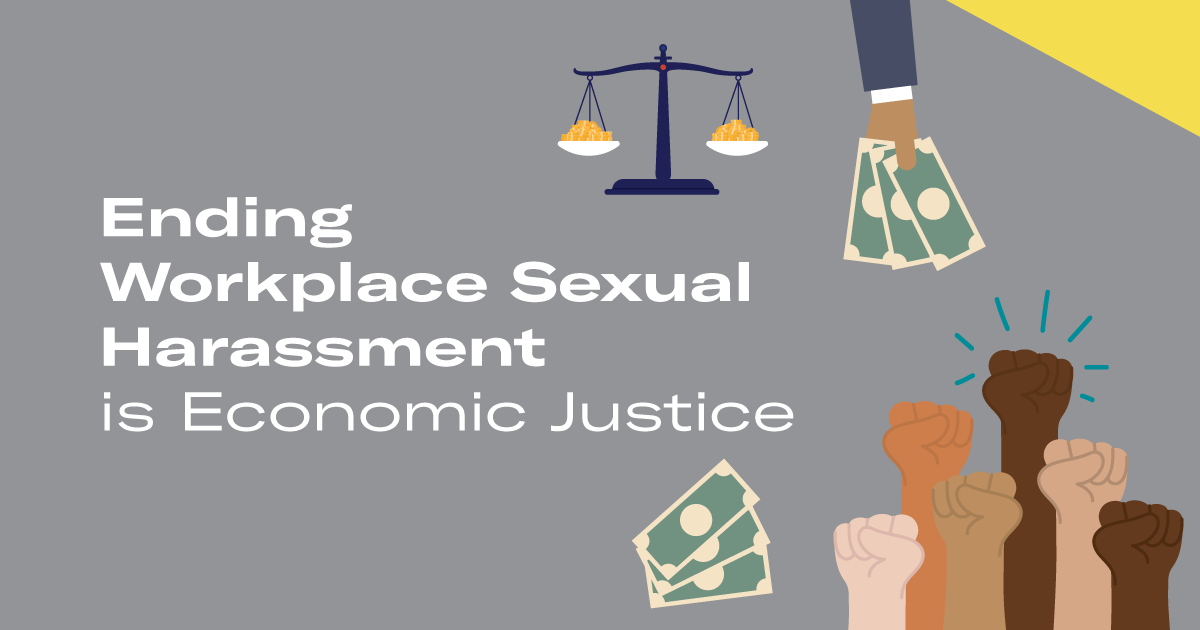
Since our founding, 9to5 has been organizing women against workplace sexual harassment, gendered perceptions of work responsibilities, and unequal career opportunities. In nearly fifty years many things have changed for women in the workplace, but we continue to face ongoing and persistent sexual harassment that has a lifelong ripple effect on our ability to thrive economically.
More than two years into the pandemic, we’ve seen scary new workplace sexual harassment trends that threaten both remote and frontline workers. As telecommuting grows in popularity, we have also seen harassers become emboldened through new, often unmonitored, technology without the concern of would-be bystanders who might intervene. In person and on the frontlines, workers, especially women of color and queer workers, have endured record amounts of harassment and discrimination while working through the pandemic, often on survival wages.
Sexual harassment is directly connected to earning potential in the short and long term, making it an important, yet often overlooked, economic justice issue. Because women of color are more likely to work in lower paying jobs that don’t have paid leave or sick time, and are more likely to experience sexual assault, abuse, and harassment, we must continue to work from the intersection of race and class to end workplace sexual harassment so women can reach their full economic potential.
In the short term, 38% of women who experience sexual harassment said sexual harassment led them to leave a job early, and 37% said it affected their career advancement. Women also may cut or change their hours to avoid their harasser. Some might face retaliation for reporting their harassment, like having their hours cut, receiving poor performance reviews, or being denied promotions or raises.
We know that people who experience any form of sexual assault, abuse, and harassment may experience physical and mental health effects. Many women, especially women of color, do not have access to supportive workplace policies, like paid leave, paid sick time, or adequate health insurance that covers mental health services, to recover from harassment. If they are able to access services, they may still encounter other economic barriers like losing hours at work or being unable to afford childcare.
These effects compound over time as women lose not only earning potential but leadership potential, contributing to the gender pay gap. When women leave jobs early or avoid a harasser, they miss out on opportunities to grow professionally, and not only is their earning potential obstructed, but also their future leadership potential.
Women already make less than their male counterparts and make even less when race, parenthood, or identity as LGBTQIA+ are accounted for. We cannot afford to lose even more due to sexual harassment in the workplace. The pay gap translates directly into a wealth gap for women that lasts their entire lives — impacting retirement savings or how much a woman is paid by social security. When a woman encounters sexual harassment in the workplace, it creates a ripple effect that follows her all the way to retirement.
Now, more than ever, strong employer and state level workplace harassment protections and policies are essential, not only for our mental and physical health, but our wallets. Workplace policies that not only respond to but prevent sexual harassment are essential to creating safe work environments, whether employees are in person on online.
In my home state of Georgia, working people do not have any statewide protections to hold perpetrators accountable for discrimination or harassment on the job. Nafeesah Robinson, a fellow with the Respect Georgia Workers Alliance, said in her testimony about the harassment she experienced, “I have had to find a new career when I was in the career of my dreams…This financial hardship resulted in my house being foreclosed on and me going into credit card debt. Right now I’m at the starting wage of where I was 15 years ago when I started my former job.”
More sexual harassment complaints are thrown out in Georgia than any other state, without any support for the survivors. We helped pass legislation during this year that protect survivors from retaliation, but we still have so much more work to do.
Most states have varying laws and protections for survivors — it’s important, particularly for employers with staff in different states, to be familiar with the laws in each state where they have employees. All states should provide as many pathways to healing and justice as possible for survivors, including providing paid time off work to heal from trauma.
State and national policies can help end sexual violence and create equitable work environments for all working women. Yes, this includes laws that protect survivors and give them pathways to justice but it also includes policies that end the wage gap, make child care affordable, and provide paid leave for all. It also means ending racism, sexism, classism and all other forms of oppression that hinder our ability to thrive.
_____
Mica Whitfield, MSW is the Georgia State Director of 9to5, National Association of Working Women. With over a decade of program development and advocacy experience, she is fiercely passionate about improving the quality of life for women across the State of Georgia. Mica has served as the Director of Programs for Healthy Mothers, Healthy Babies Coalition of Georgia (HMHBGA) and as Vice President and Advocacy Chair for Postpartum Support International- Georgia Chapter. Mica received her Master’s in Social Work from Clark Atlanta University and lives in Lawrenceville with her two children, Justice and Joy.
Resource Topics HarassmentWorkplace
